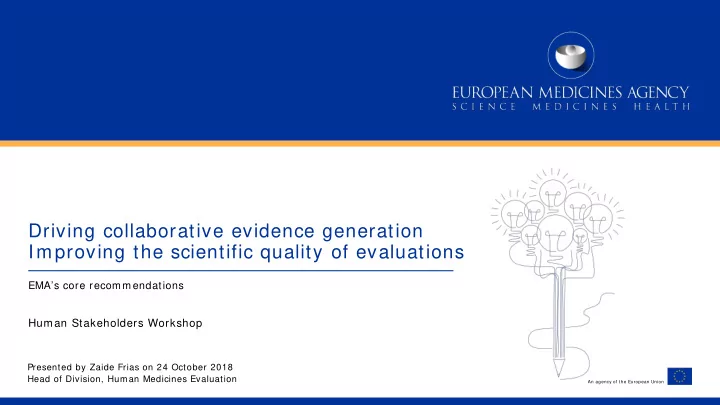

Driving collaborative evidence generation Improving the scientific quality of evaluations EMA’s core recommendations Human Stakeholders Workshop Presented by Zaide Frias on 24 October 2018 Head of Division, Human Medicines Evaluation An agency of the European Union
Introductory background Emerging science and digital technology impacts data generation and evaluation: • large scientific datasets require collaborative stakeholder involvement • enriches benefit-risk assessment with patient data • requires improved communication on the science underpinning regulatory output to patients and healthcare professionals A novel approach and strategy is needed to bring safe and effective innovative medicines faster to patients with a unmet medical needs 1 Driving collaborative evidence generation – Improving the scientific quality of evaluations
Core recommendations Leverage novel non-clinical m odels and 3 Rs Foster innovation in clinical trials (efficient design, biomarkers, endpoints) Expand benefit-risk ( B/ R) assessment and communication Invest in special populations initiatives Optimise capabilities in m odelling and sim ulation and extrapolation Exploit digital technology and artificial intelligence in decision-making 2 Driving collaborative evidence generation – Improving the scientific quality of evaluations
Leverage novel non-clinical models and 3Rs Stimulate developers to use novel pre-clinical models, including those adhering to the 3Rs Re-focus the role of the 3Rs working group to support method qualification Encourage implementation of IT tools to exploit the added value of SEND for the re-analyses of non-clinical studies to support both clinical trials authorisation (FIM) and risk minimisation across EU 3 Driving collaborative evidence generation – Improving the scientific quality of evaluations
Foster innovation in clinical trials Drive adoption of practices that facilitate Clinical Trial Authorisation, GCP and HTA acceptance Critically assess the clinical value of new and emerging endpoints and their role in facilitating patients’ access to new medicines Work with stakeholders to encourage collaborative clinical trials Collaborate with international partners in ongoing initiatives such as the Clinical Trial Transformation Initiative. 4 Driving collaborative evidence generation – Improving the scientific quality of evaluations
Develop the regulatory framework for emerging digital clinical data generation Develop methodology to incorporate clinical care data sources in regulatory decision-making Modernise the GCP regulatory oversight to enable decentralised models of clinical trials coupled with direct digital data accrual Develop the capability to assess complex datasets captured by technology such as wearables Facilitate training and understanding of healthcare professionals and patients to access and participate effectively in such trials 5 Driving collaborative evidence generation – Improving the scientific quality of evaluations
Expand benefit-risk (B/ R) assessment and communication Expand the B/ R assessment by incorporating patient preferences Develop the capability to use Individual Patient Data Improve communication with HTA and payers re. therapeutic context, comparison vs. placebo/ active-control, patient perspective Apply structured B/ R assessment to improve communication to the public Incorporate academic research into evidence-based benefit-risk communication 6 Driving collaborative evidence generation – Improving the scientific quality of evaluations
Invest in special populations initiatives Focus on speedy access for patient (sub-)populations in urgent need Identify areas of highest unmet needs where clinical care data can supplement clinical trial data Enhance multi-stakeholder advice in collaboration with patients, HCPs, payers and HTAs Progress implementation of the paediatric medicines action plan Progress implementation of the geriatric strategic plan Develop a strategic initiative in maternal-foetal health 7 Driving collaborative evidence generation – Improving the scientific quality of evaluations
Optimise capabilities in modelling and simulation and extrapolation Enhance modelling and simulation and extrapolation use across the product lifecycle and leverage the outcome of EU projects Promote development and international harmonisation of methods and standards via a multi-stakeholder platform Increase capability and redesign the operations of relevant working parties to ensure wider knowledge exchange 8 Driving collaborative evidence generation – Improving the scientific quality of evaluations
Exploit digital technology and artificial intelligence in decision-making Establish a dedicated AI test “laboratory” to explore the application of innovative digital technology to support data-driven decisions across key business processes Develop capacity and expertise across the network to engage with digital technology, artificial intelligence, cognitive computing, and its applications in the regulatory system 9 Driving collaborative evidence generation – Improving the scientific quality of evaluations
Summary Evolving science & digitalisation bring opportunities for non-clinical, clinical and post-marketing data generation Novel studies and methodologies to more accurately predict safety and efficacy Evidence generation and assessment can be enriched with patient input Evidence-based B-R communication is key to maximise impact of regulatory output Digitalisation paves the way for large datasets and advanced analytics to support decision-making EU Network needs to prepare for upcoming scientific challenges and implications (e.g. resources, data protection, cybersecurity) 10 Driving collaborative evidence generation – Improving the scientific quality of evaluations
Jan Bogaerts, European Kieran Breen, European Giovanni Tafuri, Organisation for Research Parkinson's Disease EUnetHTA and Treatment of Cancer Association (EPDA) (EORTC) Peter van Meer, Daniel Swerdlow, Mark Hope, EFPIA Regulatory Science BenevolentAI Network NL 11 Driving collaborative evidence generation – Improving the scientific quality of evaluations
Recommend
More recommend